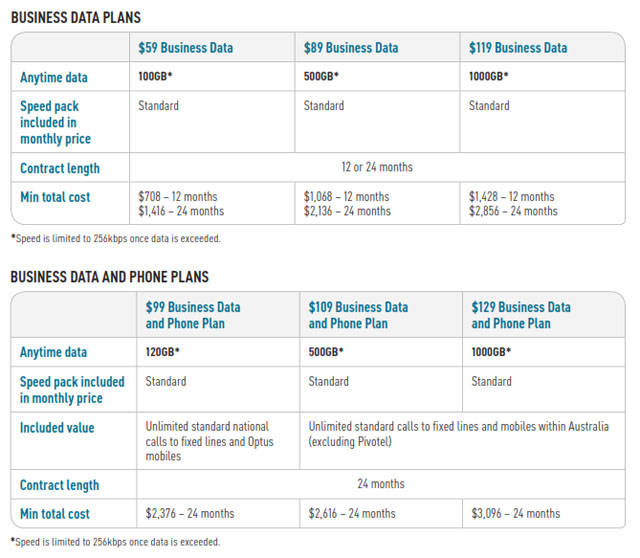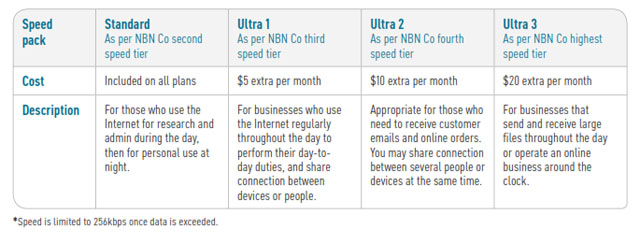news The nation’s number two telco Optus has released a clutch of National Broadband Network pricing plans aimed at small businesses, and has also revealed it will expand its consumer broadband plans in March, adding more bundles and 24 month contracts.
The company released its first tranche of consumer NBN pricing in November last year, with the plans being favourably compared to its current ADSL and HFC cable broadband pricing. The NBN plans are virtually identical to Optus’ current consumer broadband pricing.
The small business broadband plans released today come at six different levels ranging from $59 per month up to $129 base cost, depending on whether you purchase a bundled home phone line, and how much download quota you need per month (from 100GB up to a terabyte). They feature basic broadband speeds of 25Mbps, which is one of the NBN’s equivalent speed tiers to today’s ADSL broadband, but customers can boost the speeds of their Optus broadband connections in tiers, for $5, $10 or $20 per month. $20 extra per month, for example, will get you 100Mbps speeds on an NBN connection.
The other major ISP to have released NBN business plans is iiNet. In some areas, Optus’ plans are dramatically cheaper than those of iiNet. For example, an iiNet business NBN plan with 40GB of quota and speeds of 25Mbps will cost customers $84.95 a month. However, Optus has a 100GB plan with the same speeds for just $59 per month. At the top end, the two ISPs are more comparable — for example, a terabyte plan at 100Mbps will cost Optus SME customers $139 per month, and iiNet customers $129.95 per month.
Customers can sign up to either 12 month or 24 month contracts on the plan. The plans will come with what Optus is describing as its ‘NBN Wi-Fi modem’, although it did not clarify what brand or model that modem would be.
The packages also come with a package which Optus dubs its ‘OfficeApps’ email and collaboration licence. The package bundles Google’s software as a service Apps office suite together with the ability for small businesses to register their own domain name and associate it with their email account, and a bulk SMS package called ‘webSMS’.
As with its consumer NBN broadband plans, Optus’ new small business NBN plans are very similar to its existing ADSL/HFC cable broadband plans. For example, the company offers naked (without a phone line) business broadband packages ranging from $49 a month with 10GB of data, to $119 per month with a terabyte of data. The $59, $89 and $119 price points are virtually identical with those price points in Optus’ NBN business plans. And the same is true of its bundled offerings.
In a statement issued by Optus this morning, Rohan Ganeson, Managing Director for Optus SMB said: “The NBN opens the door for small businesses to take advantage of high speed broadband to do business in new ways, and make use of the latest digital tools to be more efficient and competitive. When you consider that 48 per cent of Australian SMBs don’t have a website and only four per cent are using cloud solutions such as web-hosted email, there is a huge opportunity for small businesses to embrace digital technologies.
“Optus NBN packages have been designed to offer great flexibility and value and make it easier for smallbusinesses to take the leap into the digital world, from establishing an online presence to reach new customers,to running their applications in the cloud for 24/7 access to business data. We’ve also combined OfficeApps with our NBN offerings for the first time to give small businesses that competitive edge and help lower their operating costs.”
“This is the first of many NBN packages Optus will offer to help small businesses make the most of the NBN to enhance and grow their business,” Mr Ganeson said. “As the roll-out progresses, we’ll expand our NBN packages to cater for larger offices and add more Optus OfficeApps inclusions to help businesses run their operations faster and smarter.”
The telco also noted that in March it was planning to expand its range of consumer broadband and home phone bundles and introduce 24 month contract plans.
opinion/analysis
Once again we see that Optus has launched a range of NBN plans which are virtually identical to its existing offerings in ADSL/HFC cable broadband, lending further credence to the idea that broadband prices will not be higher under the National Broadband Network.
Last week, I wrote on Delimiter that it was “factually inaccurate” for the Coalition to continue to claim that broadband prices would be higher under the National Broadband Network. The Office of Shadow Communications Minister Malcolm Turnbull has so far not responded to an invitation to comment on this issue. However, I would suggest that the release of Optus’ small business plans this morning is another nail in the coffin of that claim.
How long will it be until Turnbull and others within the Coalition admit they were wrong on this issue, or provide some evidence for their claims?




“How long will it be until Turnbull and others within the Coalition admit they were wrong on this issue, or provide some evidence for their claims?”
*tumbleweeds*
“How long will it be until Turnbull and others within the Coalition admit they were wrong on this issue, or provide some evidence for their claims? ”
How long is a piece of string?
These prices are very attractive for a SOHO, work-from-home user like myself. Bring on the NBN!
Renai, in your opinion / analysis –
“actually inaccurate”
i think you mean factually innaccurate.
Good article by the way =)
Cheers — fixed! And much appreciated :)
too bad they wont be offering this to SOUTHBRISBANE business owners…
let alone any personal residential offers…
For now at least, NBNCo might buy South Brisbane FTTH network at later point.
I thought this was confirmed? I was going to ask when NBN CO planned to buy it.
What I dont get, why with a potentially 25-100mb connection, do we still need to have speeds reverting to 256k. Surely we can rate limit to something a little bit more usable!!! [Rant Off]
I agree and i believe Renai dedicated an opinion article to this issue last year. 256k is deathly slow, take it from me, i was shaped to it last month till the end of the month for about a week. this is 2011 and the speed can load a webpage but not multiple at a time and you can forget about youtube videos even at 240p. Shaping speeds would be a lot better if they were a tenth of the purchased speeds – 12/25/50/100 mbit with 1/2.5/5/10mbit respective shaped speeds, or probably more.
He also wasn’t happy with the download limits being suitable – they are the same as current ADSL plans basically – he believes we should be moving forward with more generous limits – and i agree with him on both points – especially the shaping one.
because ISPs have to provision bandwidth over the fibre access network.
under ULL/LSS copper, ISPs just pay a flat rate with no bandwidth charge.
Once again we see that Optus has launched a range of NBN plans which are virtually identical to its existing offerings in ADSL/HFC cable broadband, lending further credence to the idea that broadband prices will not be higher under the National Broadband Network.
these retail prices reflect NBNco currently offering below-cost access to the NBN. they certainly do not prove that broadband prices in the long run will not be higher under the NBN.
(I also fully expect Telstra and TPG NBN pricing to be comparable to current ADSL pricing due to this below-cost pricing of fibre access.)
Last week, I wrote on Delimiter that it was “factually inaccurate” for the Coalition to continue to claim that broadband prices would be higher under the National Broadband Network. How long will it be until Turnbull and others within the Coalition admit they were wrong on this issue, or provide some evidence for their claims?
this is the situation in simple terms (i don’t think it’s possible to make it any simpler):
running brand new fibre to each premise makes the provision of fixed-line services more expensive than using the depreciated copper network.
NBNco is saying, “for now, we will price access to the NBN below our actual running costs… however, we expect that the average subscriber will spend more over time by migrating to increasingly expensive product tiers… this is will allow us to recoup our current losses in the future”.
Malcolm Turnbull is saying, “i disagree that the average subscriber will spend more over time on broadband services (i.e. wholesale network service alone, not retail value-added).”
basically, Mike Quigley and Malcolm Turnbull disagree on future consumer spending patterns. no one can prove that either Mike Quigley or Malcolm Turnbull are wrong because the future has not yet happened and everyone is entitled to their opinion.
so, for you to say that Malcolm Turnbull and the Coalition are “wrong on this issue” is quite frankly silly.
“Malcolm Turnbull is saying, “i disagree that the average subscriber will spend more over time on broadband services (i.e. wholesale network service alone, not retail value-added).””
Where has Turnbull ever said that. I think you’re assuming that’s what he means even though he’s never said anything of the sort. All he’s ever said is that prices on the NBN will be more expensive. Not may be in the future, but will be. And it’s a fact that at the moment, prices on the NBN are not more expensive.
Where has Turnbull ever said that. I think you’re assuming that’s what he means even though he’s never said anything of the sort.
have you read his speeches and listened to his radio interviews?
he has repeatedly attacked the viability of NBNco’s financial model on the basis that overseas telco operators have been unable to attract sufficient interest in superfast broadband, i.e. telcos are unable to charge a market premium for faster speeds. in particular, he gave a specific example of how the vast majority of broadband subscribers in Germany prefer to save an extra $10 rather than upgrade to a higher speed tier from the baseline speed. he has also given many other examples and referred to articles that discuss this issue extensively.
he has repeatedly attacked the viability of NBNco’s financial model on the basis that overseas telco operators have been unable to attract sufficient interest in superfast broadband
Why is there still a hangup with the NBN being a “superfast broadband” network?
The NBN is NOT an internet service, it is a layer2 network, it can carry whatever traffic you want over it, data, voice, video (ie. on demand video, Foxtel, etc), etc. Writing off the network solely because of offshore telco internet user takeup is just naive.
Comments are closed.